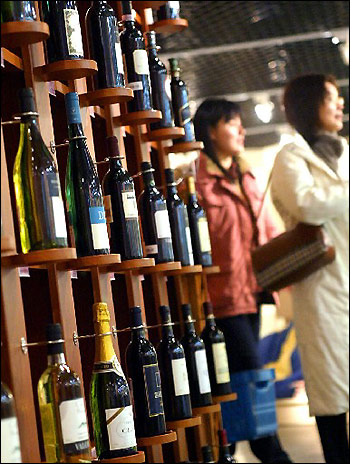Strengthening its management of the wine consumption tax, the
State Administration of Taxation issued the Administrative Measures
for the Wine Consumption Tax (Trial), implemented since July 1 this
year, the China Business News reported on August 29.
Since January 1, 2005, tariffs on imported bottled wine dropped
from 43 to 14 percent with that on bulk wine imports falling to 20
percent. It was hoped that the resulting price fall would enable
foreign wines to compete with domestic brands. However, the top
three domestic brands – Great Wall, Zhangyu and Dynasty – still
control more than 60 percent in the Chinese market with their share
continuing to rise.
Foreign wines displayed
on shelves in a Shanghai market
Chen Xun, an industrial analyst with Ping'an Securities, said
the tariff and price drops had increased the inflow of foreign
brands. China Customs statistics show that in January to February
this year, China imported 17.78 million liters of wine, up 78.6
percent year-on-year from 2005. However, foreign wine still cannot
mount a real challenge to the domestic industry at present, said Li
Weige, general manager of the Beijing Donghai Xinye Commercial and
Trade Company, a distributor of the famous French Castel wine in
China.
Currently, the average price of wine in bulk is only one-fifth
of that of bottled wine. China Customs statistics show that
although imports increased by 78.6 percent in Jan-Feb 2006, their
value of US$16.70 million was only 35 percent higher.
A wine surplus is a serious global problem. In Australia, bumper
grape harvests for three years running have resulted in national
grape stocks reaching 1 billion kilos, depreciating the average
price of bulk wine imports to under US$1 per liter; while in east
China grape yields showed a drop last year with the purchase price
up 30-40 percent. Naturally, this has stimulated grape wine
imports.
According to Jing Xingyu, chief executive officer of the Westman
Investment Consulting Co., most foreign brand operations do not
conform to the Chinese market's characteristics.
Currently, foreign wines enjoy a strong state-related brand-name
reputation, but this carried limited influence. For example,
Chinese consumers agree that French wine is good, but they can't
tell which brands are more reliable. Even some industry insiders
know little about foreign wine brands. High-grade brands are sold
in large cities like Beijing, Shanghai and Guangzhou, but consumer
numbers are low.
No longer do Chinese wine aficionados rely on price instead of
quality, but a decision-making dependence on advertising remains.
Zhangyu, Dynasty and Great Wall brands are accepted by Chinese
consumers due to their successful promotion. "Impression on brands
has become the main reason for consumers' purchasing actions," Jing
Xingyu said.
The weakness of foreign wine brands is related to their
operational mode, said insiders. In Europe, the world's most
important grape producer, most wine producing areas have low yields
due to traditional and legal restrictions. Some famous wine-makers,
benefiting from only a few ridges of grape vines, produce a low
annual output of 50,000 bottles. Thus, it is difficult for them to
form large scale brand operation and sales.
European wine tradition, in France and Italy in particular, is
founded on the principles of quality and exclusivity. In this way,
the market is not flooded with high-quality wine but is able to
accommodate a myriad of different wines, each tailored to various
palates. The price range is also able to fluctuate, allowing all to
enjoy the marvels of wine, and enabling higher-quality producers to
keep their prices up. Thus, the reason for low yields in elite
wine-producing areas stems from the desire of European
wine-drinkers to savor "grands crus" (high-quality wines) as a
rarity.
 |
In sale methods, foreign brands face a "lack of
acclimatization." "In foreign countries, instead of actively
marketing, wine businesses wait for buyers," said Li Weige. "That's
a direct variance to Chinese custom". Foreign counterparts are
often surprised by Chinese ways of operating. In countries where
wine is established, people often buy wine through wine clubs or at
high-grade wine-tasting parties, or via special promotions. But
these kinds of channels still cannot impact upon the Chinese
market. To foreigners, collecting fees for entrance tickets, bottle
openings and sales promotions is unimaginable.
"Currently foreign brands do not have a controlling capability
in the Chinese market," said Jing Xingyu. Foreign brands are sold
in China via agents, and most of the market investments are
undertaken by the agents themselves. However, since agents and
enterprises often have conflicting aims, operations often fall
short of required standards. Due to excessive production lines,
some agents cannot adequately advertise or promote their goods. For
example, one agent serves more than 800 brands, making it
impossible to conduct equal promotion for all. The costs of acting
as a foreign wine agent are also much bigger than those for
domestic clients.
Foreign wine brands have been short-sighted in their approach to
the China market. "You cannot gain profits from wine until after a
number of years of investment," Li Weige said. However, few wine
brands stick it out. In 1997 and 1998, foreign brands enjoyed a
fast growth in China, but many withdrew as the trend slowed
down.
"Agents of foreign brands experience more difficulties than
those of domestic brands," said Li. Nevertheless, foreign wines
supported by experienced and popular Chinese firms can reveal a
large customer base.
"Sales of foreign brands still have a large profit space. There
is space for price hikes up to 60 percent in large distribution
areas," said an insider. "If we add on the 10 percent transport
fee, 14 percent tariff, together with added value consumption tax,
packaging fees and logistics fees, additional costs will weigh
considerably on the cost to the consumer," said Li.
(China.org.cn by Li Jingrong, September 1, 2006)